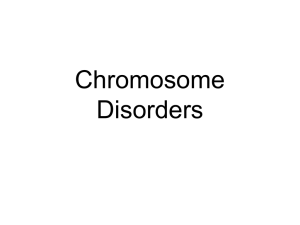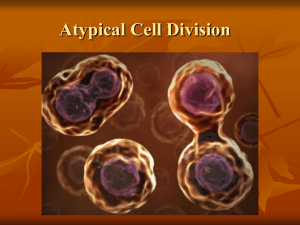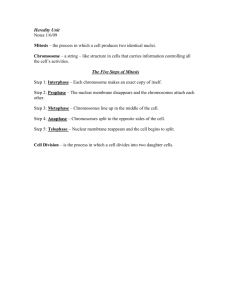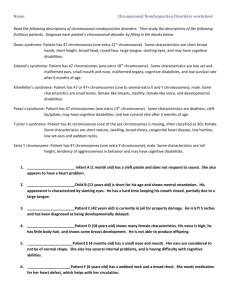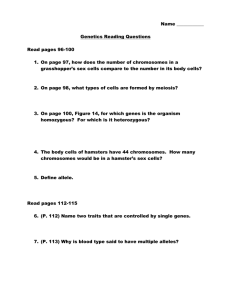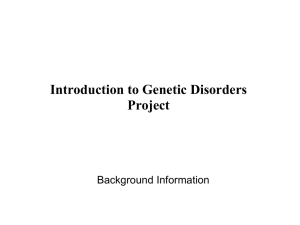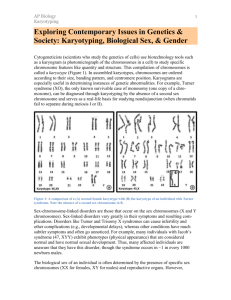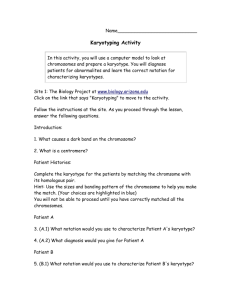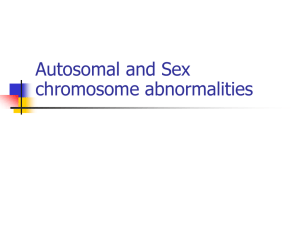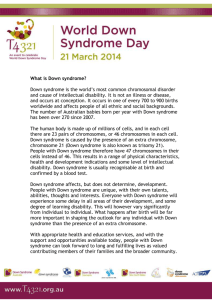NAME
advertisement
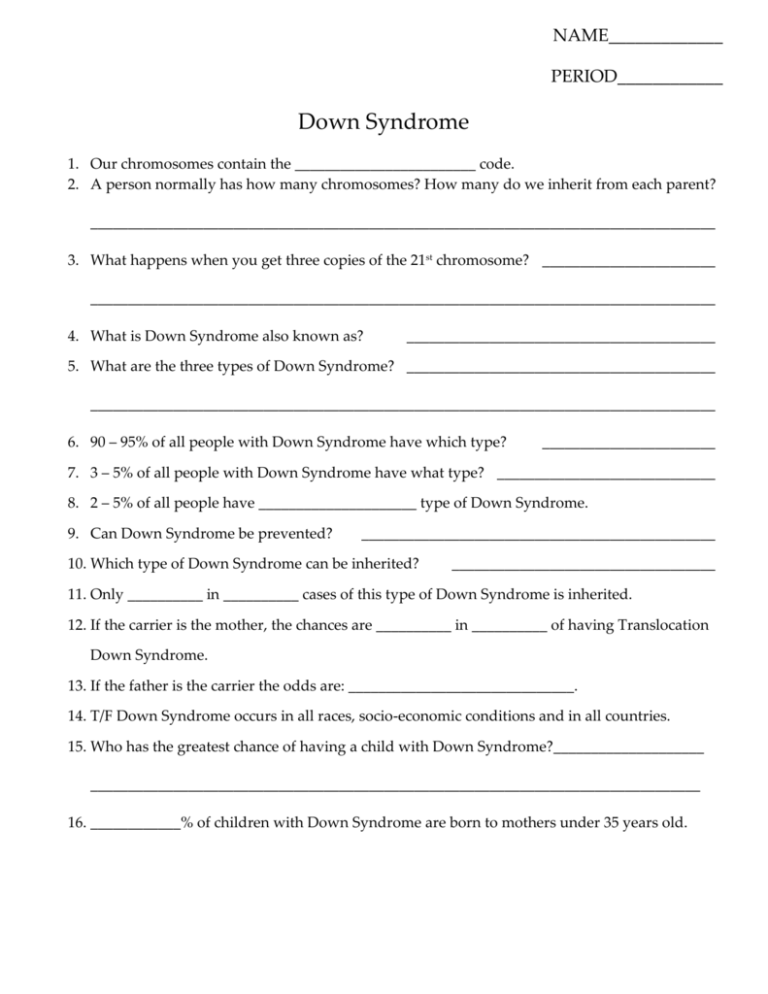
NAME_____________ PERIOD____________ Down Syndrome 1. Our chromosomes contain the ________________________ code. 2. A person normally has how many chromosomes? How many do we inherit from each parent? ___________________________________________________________________________________ 3. What happens when you get three copies of the 21st chromosome? _______________________ ___________________________________________________________________________________ 4. What is Down Syndrome also known as? _________________________________________ 5. What are the three types of Down Syndrome? _________________________________________ ___________________________________________________________________________________ 6. 90 – 95% of all people with Down Syndrome have which type? _______________________ 7. 3 – 5% of all people with Down Syndrome have what type? _____________________________ 8. 2 – 5% of all people have _____________________ type of Down Syndrome. 9. Can Down Syndrome be prevented? _______________________________________________ 10. Which type of Down Syndrome can be inherited? ___________________________________ 11. Only __________ in __________ cases of this type of Down Syndrome is inherited. 12. If the carrier is the mother, the chances are __________ in __________ of having Translocation Down Syndrome. 13. If the father is the carrier the odds are: ______________________________. 14. T/F Down Syndrome occurs in all races, socio-economic conditions and in all countries. 15. Who has the greatest chance of having a child with Down Syndrome?____________________ _________________________________________________________________________________ 16. ____________% of children with Down Syndrome are born to mothers under 35 years old. What are chromosomes? Our chromosomes contain the genetic code which controls and instructs cell division, growth and function. They are the structures inside the nucleus of living cells that contain hereditary information. A person normally has 46 chromosomes, 23 inherited from each parent. Every person has a unique genetic code (with the exception of identical twin). It is this uniqueness which makes the physical appearance of each person different. How do we get our chromosomes? Our chromosomes are given to us by our parents. Each parent gives us 23 chromosomes which comes from the egg and the sperm cells. When they combine, they produce a cell with 46 chromosomes. This cell then divides, the result being that every cell contains identical genetic material. What is Down Syndrome? Down Syndrome is caused by a person having three copies of chromosomes 21 instead of two copies. This is way Down Syndrome is also referred to by the name trisomy 21. Instead of a pair of chromosomes, as found in all the other chromosomes, number 21includes three chromosomes. It is important to understand that all of the other chromosomes of this person are normal. It is a fact that there is an extra chromosome that causes down syndrome. Every cell in a person with Down Syndrome will contain 47 chromosomes (with the exception of Mosaic Down Syndrome) instead of 46 chromosomes. There are many theories about how the extra chromosome causes the effects of Down Syndrome but little is currently known. Research, however, is continuing and a breakthrough may provide possible treatments to lessen the effects. How does this happen? During cell division to create a germ cell(either sperm or egg),a cell containing 46 chromosomes divides into two germ cells each containing 23 chromosomes. Sometimes this division does not happen properly and one cell may contain 22 chromosomes and the other may contain 24 chromosomes. This can happen if the chromosomes does not properly separate and instead “stick together.” This is called nondisjunction because the chromosomes have failed to disjoin or split-up. 75% of the time it is the egg cell that carries the additional chromosomal material, 25% of the time it is the sperm cell. If the cell containing 24 chromosomes combines with a cell containing 23 chromosomes, the new cell will contain 47 chromosomes instead of 46. If the trisomy is chromosome 21, the person will have Down Syndrome. Other conditions arise if the duplicated chromosome is a different chromosomes. If the trisomy is chromosome 13, the person will have Patau's syndrome. If the trisomy is chromosome 18, the person will have Edward's Syndrome. These conditions are rarer than Down Syndrome and have their own characteristics which are different than Down Syndrome. Are there different types of Down Syndrome? There are three different types of Down Syndrome: Standard Trisomy 21, Translocation, and Mosaicism. Standard Trisomy 21 is when the extra chromosome 21 comes from either the egg or sperm cell. Between 90% and 95% of all Down Syndrome is Standard Trisomy 21. Translocation is caused when a piece of chromosome 21 is located on another chromosome such as chromosome 14. The person with translocation Trisomy 21 will have 46 chromosomes but will have the genetic material of 47 chromosomes. This occurs between 3% and 5% of cases of Down Syndrome. Mosaicism is when a person has a mix of cells, some containing 46 chromosomes and some containing 47 chromosomes. This occurs either because: a) The person received 46 chromosomes at fertilization but somewhere during early cell division the chromosome 21 cell pairs failed to split creating a cell 47 chromosome and a cell with 45 chromosomes. The cell with 45 chromosomes can not survive but the cell with 47 will continue to divide. All cells that come from this cell contain 47 chromosomes. b) The person received 47 chromosomes at fertilization but later during cell division the extra chromosome is lost. Mosaicism occurs in 2% to 5% of case of Down Syndrome. A person with Mosaic Down Syndrome may exhibit all, some , or none of the characteristics of Down Syndrome depending on the percent of cells carrying the extra chromosome and where these cells are located. Is Down Syndrome inherited ? The vast majority of cases of Down Syndrome are not inherited. Only in cases of Translocation Down Syndrome and then in only 1 of 3 cases of this type of Down Syndrome is the condition inherited. These inherited cases occur because one of the parents is a carrier. A carrier will have 45 chromosomes instead of 46 but they will have all the genetic material of a person with 46 chromosomes. Remember that in Translation Down Syndrome the extra material but will have only one chromosome 21. The carrier will not exhibit any of the symptoms of Down Syndrome because they have the correct amount of genetic material. A carrier will have an increased chance of having a child with Down Syndrome. If the carrier is the mother, the chances are approximately 1 in 5 of having a child with translocation Down Syndrome. If the carrier is the father the odds are reduced to between 1 in 20-50. In cases where the carrier has no attached chromosome 21 , all the carriers children will have Down Syndrome. In all cases of Down Syndrome but especially in cases of Translocation Down Syndrome, it is important that the parents have genetic counseling to determine their risk. Did I cause my child to have Down Syndrome? Simple answer: No! There is nothing you can do to prevent Down Syndrome and nothing you can do to change your odds of having a child with Down Syndrome. Down Syndrome occurs in al races, in all socioeconomic conditions, and in all countries. No relationship between diet or illness and Down Syndrome has ever been found. The only established relationship is with maternal age. A woman is more likely to have a child with Down Syndrome as she grows older with a sharp rise in risk at 35-40 years of age. However, 80% of all children with Down Syndrome are born to mothers under 35.
